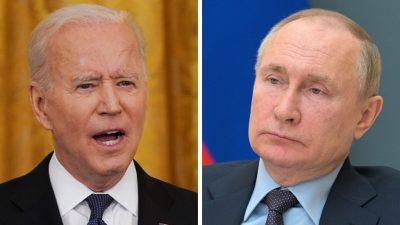Putin’s Statement on Russia’s ‘Red Lines’

All Global Research articles can be read in 51 languages by activating the “Translate Website” drop down menu on the top banner of our home page (Desktop version).
To receive Global Research’s Daily Newsletter (selected articles), click here.
Visit and follow us on Instagram, Twitter and Facebook. Feel free to repost and share widely Global Research articles.
***
This article was originally published in November 2021 under the title: Putin Says West Taking Russia’s ‘Red Lines’ Too Lightly is of significance to an understanding of unfolding events in Ukraine and Russia’s decision to invade Ukraine on February 24, 2022
***
President Vladimir Putin said on Thursday (18 November 2021) that the West was taking Russia’s warnings not to cross its “red lines” too lightly and that Moscow needed serious security guarantees from the West.
In a wide-ranging foreign policy speech, the Kremlin leader also described relations with the United States as “unsatisfactory” but said Russia remained open to dialogue with Washington.
The Kremlin said in September that NATO would overstep a Russian red line if it expanded its military infrastructure in Ukraine, and Moscow has since accused Ukraine and NATO of destabilising behaviour, including in the Black Sea.
In the televised speech, Putin complained that Western strategic bombers carrying “very serious weapons” were flying within 20 km (12.5 miles) of Russia’s borders.
“We’re constantly voicing our concerns about this, talking about red lines, but we understand our partners – how shall I put it mildly – have a very superficial attitude to all our warnings and talk of red lines,” Putin said.
NATO – with which Moscow severed ties last month – had destroyed all mechanisms for dialogue, Putin said.
He told foreign ministry officials that Russia needed to seek long-term guarantees of its security from the West, though he said this would be difficult and did not spell out what form the assurances should take.
Russia-West ties have been at post-Cold War lows for years, but the tone has sharpened in recent weeks as Ukraine and NATO countries have raised fears over Russian troop movements near Ukraine’s borders and tried to guess Moscow’s real intentions.
But despite a growing list of disputes, the Kremlin has maintained high-level contacts with Washington and spoken repeatedly of a possible summit between Putin and US President Joe Biden to follow up their initial meeting in Geneva in June, which Putin said had opened up room for an improvement in ties.
Russian Security Council Secretary Nikolai Patrushev and US National Security Adviser Jake Sullivan discussed cybersecurity, Ukraine and the migrant crisis on the Belarus border in a phone call on Wednesday, the Kremlin said.
“This was all in the framework of preparation for … high-level contact,” Kremlin spokesman Dmitry Peskov said.
*
Note to readers: Please click the share buttons above or below. Follow us on Instagram, Twitter and Facebook. Feel free to repost and share widely Global Research articles.
Featured image is from The Unz Review

